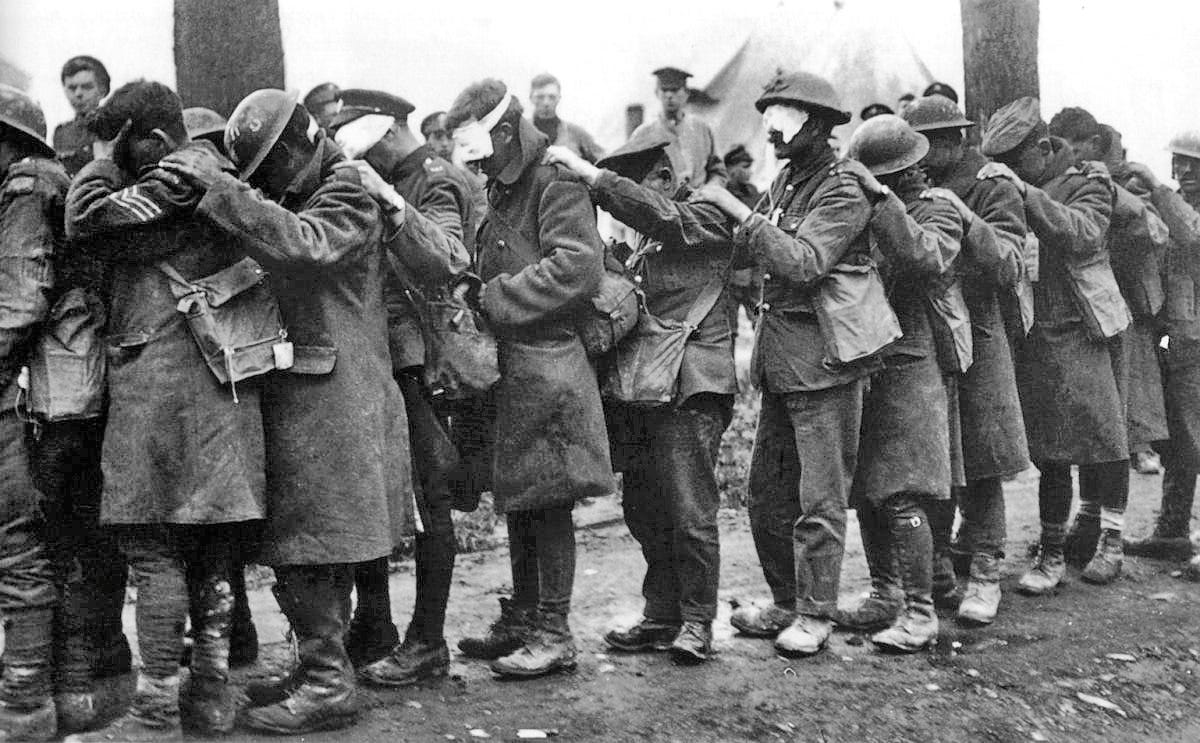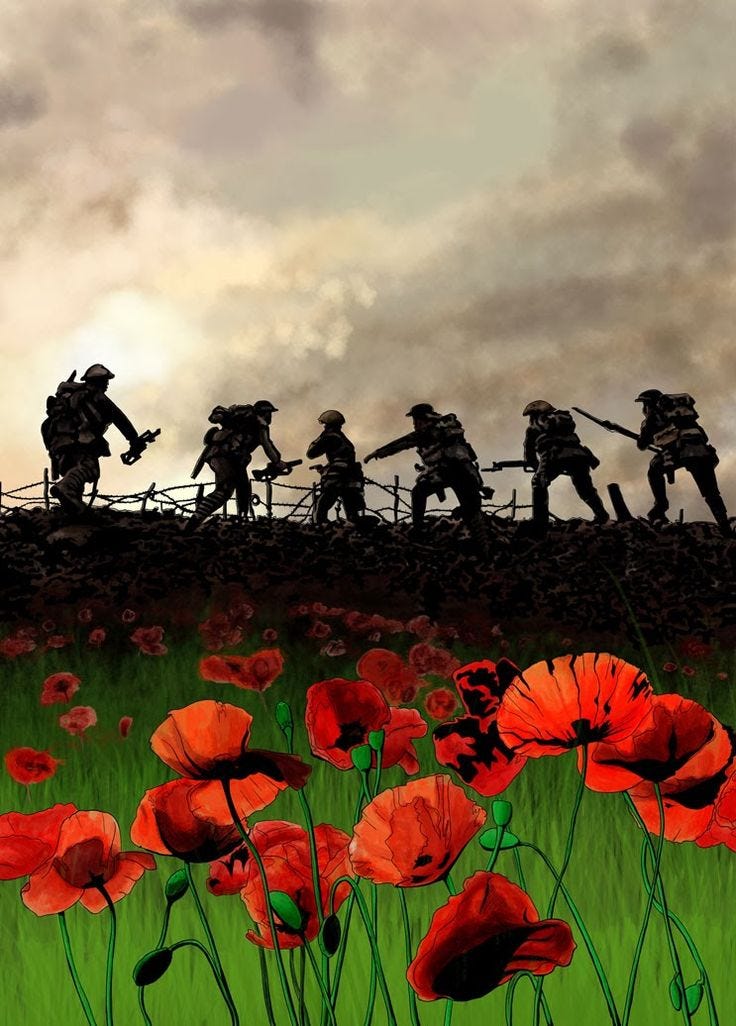Rumours and misinformation are a tricky thing. They can shape the world, write history, and even define a people for a generation.
There is an example of this in Canadian history, buried under the pleases and thank yous. The pardon mes and the compulsive apologies.
When I was in high school, one of the criteria for graduation was 40 hours of community volunteering. For 20 of those, I spent time at one of the local Legions, talking and playing games with elderly veterans. I was lucky enough to speak to some vets of the First World War.
I was always so blown away by the horrors they were willing to share. But what confused me at the time was that most still held varying degrees of hatred for the Germans. One of those men, named Wilbur, wouldn't even talk to me until I assured him that I wasn't. Wilbur is long gone now. They all are.
We sat through our Canadian history classes that always hit the same points. How the wars started, some stuff about railroads, and this Louis Riel guy that was besties with the divine. All surface level, the usual black and white.
But today, I'm tearing some of our skeletons out of the closet to show what humanity is capable of. Not to condemn our forefathers or demonize their actions, but to serve as a lens to what disinformation can do to the traumatized soul of the vulnerable. For this, I'm going to take you back more than a hundred years, to a war that both defined and wreaked havoc on a naive nation.
When war broke out in 1914, Canadians volunteered in droves out of loyalty to Britain and a sense of adventure. Canadians at the time were mostly rural farmers, the children of immigrants, and tough as nails. Even though Canada was required to enter the conflict due to its status as a Dominion of the crown, we had no need for convincing.
The war would be over by Christmas.
At first, there was an unspoken policy of live and let live. Unless you were ordered to do so, troops from either side wouldn't needlessly kill each other. This view even translated to the famous 1914 Christmas truce, where soldiers from either side came out of their trenches to sing carols, play soccer with ration tins, and bury their dead in joint funerals. The Canadians had just finished their training, and for many this was their first wartime experience.
What came next could not have been more different.
On April 22nd 1915, in the waning daylight of late afternoon, Canadian soldiers peered out of their trenches to see a spectral green mist approaching them, making a hissing noise that would haunt them for the years that followed. This was the first gas attack in history.
When they finally realized what was happening, the gas had already swallowed the world. Those lucky enough to understand quickly urinated in their handkerchiefs and wrapped them around their faces. They watched their comrades melt from the inside out.
And then the Germans came.
For four days and nights, the Canadians fought surrounded on three sides, battered by shells, choked by gas, short of water, sleep, and hope. No one was coming for them. And yet, they held the line. At Kitchener's Wood they counterattacked, with trees exploding around them, and pushed the Germans back.
The famous poet of 'In Flanders Fields', Lieutenant-Colonel John McCrae, described it as follows:
“The general impression among us was that we were not expected to live. We had a sickening sense of helplessness and horror... The dead were piled three deep in places, and the wounded kept coming, hour after hour. There was no poetry in it — only filth, blood, and death.”
As the ghostly survivors made their way off the front lines, bandaged and blinded, they shared their stories of horror. It was around this time that a story began to circulate among the troops.
As the story went, a Canadian officer had been captured during the battle. The Germans tortured him, crucified him on a barn door, and used him for target practice. The news spread like wildfire and appeared on the front pages of Allied newspapers. The Canadian government launched an inquiry, and it became an integral part of recruitment efforts.
We know now that this never happened.
Regardless, the event drew a line in Canadian participation in the war. The soldiers became fueled by hatred and vengeance. The enemy was now evil, and deserved everything that was coming to them.
Canadians quickly built a reputation among the troops on both sides of the conflict. To the British, they were seen as reliable, courageous, resilient and ferocious. The Germans grew to fear them, with one famous quote saying that "They are not like the others. They fight like the devil, and they do not give ground." They were seen as brutal and unrelenting, violating all existing gentlemanly rules of war.
When Christmas came again, the Germans tried to repeat the truce of the previous year, throwing cigarettes and tins of food into the Canadian trenches. The Canadians responded with grenades.
Canadians began volunteering for the most dangerous and risky of assignments. They also became famous for their night raids that would terrify the Germans and break morale. During these raids, the Canadians would blacken their faces and crawl across No Mans Land. They would leave their guns behind, instead using knives, bayonets, nail-studded clubs, and shovels.
They would show no mercy. They would take no prisoners. They were savage and unrelenting. They killed anyone they came across.
They became deeply scarred by the violence. Memoirs and postwar reflections often talk of brutal personal struggles with the emotional toll of raiding and the sheer savagery involved. One particularly jarring example tells the story of a Canadian soldier putting a live grenade in the pocket of a German prisoner because he felt there were too many to safely escort back to the line.
When the last bullets were fired, and the Canadians returned home, they arrived in a society that was not at all equipped to help them. Most suffered from PTSD and were told to 'man-up' while they silently lost themselves in nightmares, insomnia, numbness, alcoholism, and rage. They became stangers in their own homes, with no one to talk to about what they had done.
Soon after, organizations and 'Legions' began to form as a place where veterans could share their experiences and tell stories of their fallen friends without judgement. For many, these became lifelines when all hope was lost. They encouraged each other to write memoirs, paint, and create poetry to somehow describe what they lived through to those that would never understand.
They helped each other fill in the holes left by the pieces of their humanity that still laid in the fields of Flanders.
All because of a rumour.
And so, generations later, I sat across from a frail old man in the final act of his over 90 years of life. I saw it as a chore - something I had to do to graduate, and nothing more.
But now a middle-aged version of myself sits here to type this all up, with the regret of not listening to man that deserved to be heard. Half way through writing this, and against my better judgement, my Genealogical curiosity got the better of me, and I found out that Wilbur died just a few months after we spoke.
I struggle to find some meaning to what I just shared with you. There's no hope to be found in this tragedy in even the most optimistic lens. But I needed to tell someone about the horrors that they dared not speak of, living in a world that could not have possibly understood. I hope this may serve as a lesson of what misinformation can do, to even the best of us.
Wilbur, wherever you may be, I hope you've found some peace.
I haven't forgotten you.







Mugsy - incredibly searing and moving piece. Thank you for sharing your experience, and for sharing that of Wilbur and so many who were there with him. And also so crucially: for making the vital point about the insidiously devastating effect of misinformation, whether incidental or intentional.
Thank you! You write beautifully and your work is so important during these stressful, terrifying times.